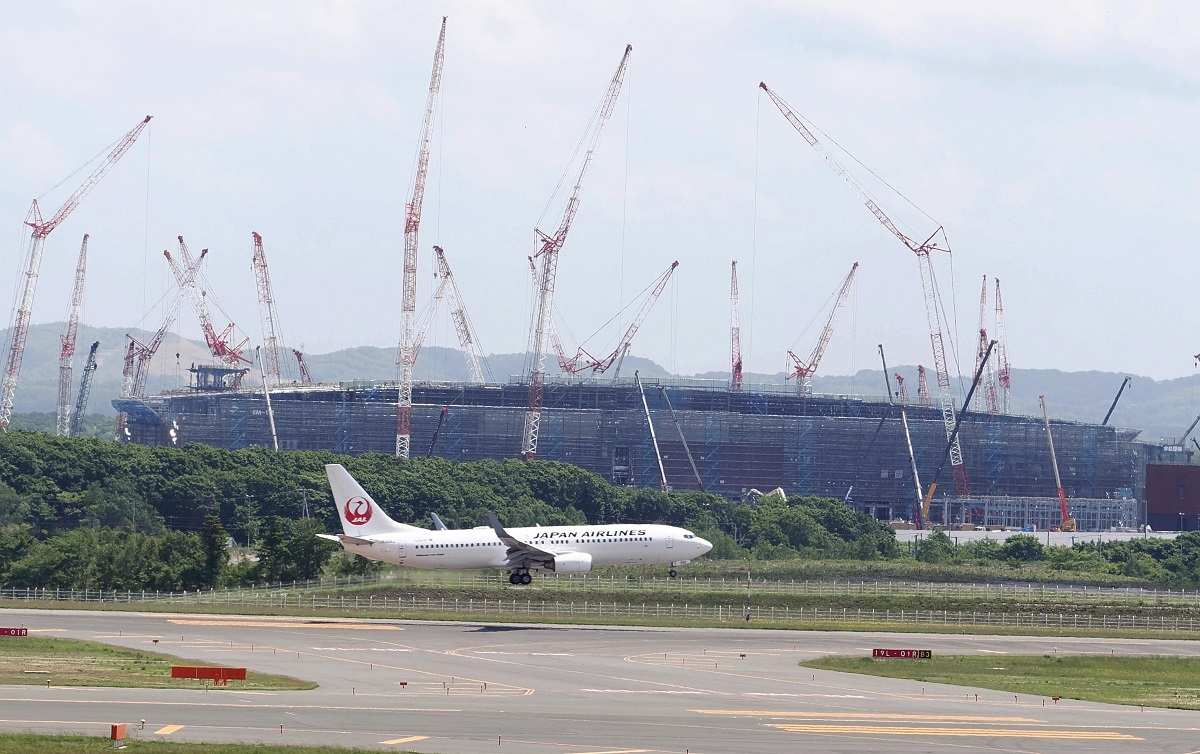Japan Seeks to Expand Domestic Semiconductor Production; Local Governments Anticipate Economic Benefits From Plants

A Rapidus Corp. factory is under construction near New Chitose Airport in Chitose, Hokkaido, on Wednesday.
6:00 JST, June 18, 2024
In a bid to strengthen supply chains and economic security in the wake of the global shortage of semiconductors caused by the COVID-19 pandemic, the government is encouraging businesses and other organizations to expand domestic production of semiconductors. Plans to build factories for semiconductor-related industries have been mapped out across the country.
A wide range of businesses support the semiconductor industry, and local governments are expecting positive ripple effects from these initiatives.
Construction boom
A plot of land on the east side of New Chitose Airport, a gateway to Hokkaido, was recently crowded with cranes. A factory for Tokyo-based chipmaker Rapidus Corp. is being built there at a rapid pace.
Rapidus was established in 2022 and is funded by major Japanese companies. It also receives financial support from the central government.
In February last year, Rapidus announced it would build a plant in Chitose, Hokkaido, to mass produce next-generation chips with a circuit line width of 2 nanometers. The company plans to start the operation of a prototype production line at the plant in April next year, to prepare for full-scale operations to begin in 2027.
About 1,000 employees are expected to live in Chitose when operations start at the plant, so condominiums are being built in the center of the city. In fiscal 2023, about 40 construction permits for apartment buildings were issued in the city, more than double the number the previous year.
“We decided to enter the Hokkaido market after seeing the construction boom in Kumamoto Prefecture that took place after Taiwan Semiconductor Manufacturing Co. moved into the area,” said Masahiro Otsuka, president of Well Holdings Co., a real estate development company in Fukuoka City that is constructing a rental apartment building in Chitose.
Construction of the plant has also created cleaning, security and other jobs. The Chitose Chamber of Commerce and Industry, which serves as a contact point for relevant business and other activities, has received a number of inquiries related to Rapidus.
The number of special members of the chamber — business operators based outside the city — increased to 46 at the end of March 2024 from 26 at the end of March 2023.
Land prices are also soaring. According to official values as of March released by the Land, Infrastructure, Transport and Tourism Ministry, four of the 10 locations nationwide that saw the greatest rise in residential land prices were in Chitose.
Three of the 10 commercial plots that saw the highest increase in land prices also were in the city.
“Due partly to high materials costs, it’s becoming difficult for the general public to buy real estate in the city,” a property company president said. Chitose Mayor Ryuichi Yokota said in May the city wants to continuously supply residential land space as needed so there will no shortage of plots.
Newly established positions
Leading Taiwan semiconductor contract manufacturer Powerchip Semiconductor Manufacturing Corp. (PSMC), in partnership with Tokyo-based major securities house SBI Holdings Inc., plans to start operations at a new plant in 2027 in Ohira, Miyagi Prefecture.
The village of Ohira is home to Toyota Motor East Japan Inc., and the surrounding area hosts many automobile-related companies. Since the automotive and semiconductor industries share common ground, local governments in surrounding areas are establishing new departments or positions to support the semiconductor industry to take advantage of the opportunity.
In December, the Miyagi prefectural government established a seven-person office to promote the semiconductor industry, and on May 2 Miyagi Gov. Yoshihiro Murai attended the opening ceremony of a new plant built by PSMC in Taiwan.
Murai appeared to have been impressed by the scale of the new plant, which will serve as a model for the Ohira plant. “We must provide significant support” to the semiconductor industry in the prefecture, he said.
The city of Sendai also created a new section chief post in charge of semiconductor-related industries as of June 1. The city will promote studies as well as sales and marketing activities to bring related businesses to the city, taking into account that a factory office will be opened in Sendai in as early as July.
“We want to maximize the economic benefits for the city,” said Tomoyuki Goto, a section chief of the city office.
Kenji Nakamura, director of the Kushiro Public University Research Center for Regional Economics at Kushiro Public University of Economics, said, “Local governments should focus on measures that will bring in related industries, such as the development of communications infrastructure for information technology companies, which are closely linked to the semiconductor sector.”
“The influx of talented people from Japan and overseas will make it also necessary to create a town that is comfortable for them to live in with their families. This is an excellent opportunity to improve the quality of education, leisure activities and others in the concerned areas,” Nakamura said.



